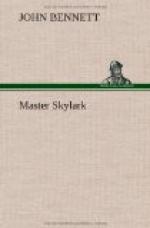Nick Attwood pricked his keen young ears. “They’re coming, Robin—hark ’e to the trampling!”
Robin Getley held his breath and turned his ear toward the south. The far-off murmur was a mutter now, defined and positive, and, as the two friends listened, grew into a drumming roll, and all at once above it came a shrill, high sound like the buzzing of a gnat close by the ear.
Little Tom Davenant dropped from the finger-post, and came running up from the fork of the Banbury road, his feet making little white puffs in the dust as he flew. “They are coming! they are coming!” he shrieked as he ran.
Then up to his feet sprang Robin Getley, upon the saddle-backed coping-stones, his hand upon Nick Attwood’s head to steady himself, and looked away where the rippling Stour ran like a thread of silver beside the dust-buff London road, and the little church of Atherstone stood blue against the rolling Cotswold Hills.
“They are coming! they are coming!” shrilled little Tom, and scrambled up the coping like a squirrel up a rail.
A stir ran out along the guard-wall, some crying out, some starting up. “Sit down! sit down!” cried others, peering askance at the water gurgling green down below. “Sit down, or we shall all be off!”
Robin held his hand above his eyes. A cloud of dust was rising from the London road and drifting off across the fields like smoke when the old ricks burn in damp weather—a long, broad-sheeted mist; and in it were bits of moving gold, shreds of bright colors vaguely seen, and silvery gleams like the glitter of polished metal in the sun. And as he looked the shifty wind came down out of the west again and whirled the cloud of dust away, and there he saw a long line of men upon horses coming at an easy canter up the highway. Just as he had made this out the line came rattling to a stop, the distant drumming of hoofs was still, and as the long file knotted itself into a rosette of ruddy color amid the April green, a clear, shrill trumpet blew and blew again.
“They are coming!” shouted Robin, “they are coming!” and, turning, waved his cap.
A shout went up along the bridge. Those down below came clambering up, the punts came poling with a rush of foam, and a ripple ran along the edge of Stratford town like the wind through a field of wheat. Windows creaked and doors swung wide, and the workmen stopped in the garden-plots to lean upon their mattocks and to look.
“They are coming!” bellowed Rafe Hickathrift, the butcher’s boy, standing far out in the street, with his red hands to his mouth for a trumpet, “they are coming!” and at that the doors of Bridge street grew alive with eager eyes.
At early dawn the Oxford carrier had brought the news that the players of the Lord High Admiral were coming up to Stratford out of London from the south, to play on May-day there; and this was what had set the town to buzzing like a swarm. For there were in England then but three great companies, the High Chamberlain’s, the Earl of Pembroke’s men, and the stage-players of my Lord Charles Howard, High Admiral of the Realm; and the day on which they came into a Midland market-town to play was one to mark with red and gold upon the calendar of the uneventful year.




